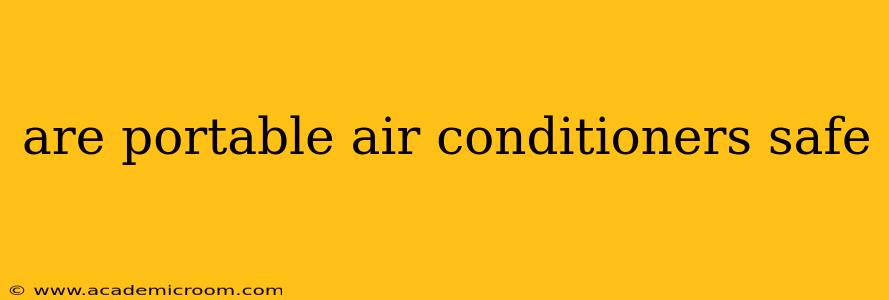Are Portable Air Conditioners Safe? A Comprehensive Guide
Portable air conditioners offer a convenient cooling solution, but safety concerns naturally arise. This comprehensive guide addresses common anxieties and provides a clear picture of the safety aspects surrounding these units. We'll delve into potential hazards and how to mitigate them, ensuring you can enjoy cool comfort with peace of mind.
What are the potential safety hazards of portable air conditioners?
This is a key question many people have. The primary safety concerns surrounding portable air conditioners revolve around:
- Electrical Hazards: Like any electrical appliance, malfunctioning portable AC units can pose risks of electric shock or fire. Faulty wiring, overloaded circuits, or damaged components can all contribute to these hazards.
- Water Leaks and Damage: Portable AC units use water to condense moisture from the air. Leaks can occur due to faulty drainage systems, leading to water damage to your property. This is especially true if the unit isn't properly leveled or if the drain hose is not properly secured.
- Improper Ventilation: Inadequate ventilation can lead to overheating of the unit, potentially causing a fire. Insufficient air intake can also reduce efficiency and increase the risk of compressor damage.
- Carbon Monoxide Poisoning (rare): While less common with modern, well-maintained units, improperly vented portable ACs can potentially release carbon monoxide into the room. This is rare, particularly with units specifically designed to exhaust hot air outside.
How can I use a portable air conditioner safely?
Safe operation is paramount. Here's how to minimize risks:
- Regular Maintenance: Regularly inspect the unit for any signs of damage, such as frayed cords, loose connections, or unusual noises. Clean the filters frequently to ensure optimal performance and prevent overheating.
- Proper Ventilation: Always ensure adequate ventilation around the unit. Never block the air intake or exhaust vents. Follow the manufacturer's guidelines regarding placement and ventilation.
- Correct Electrical Connections: Use the correct power outlet and avoid overloading circuits. Consider using a dedicated circuit if possible. Never attempt to repair electrical components yourself; always contact a qualified technician.
- Proper Drainage: Regularly empty the water collection tank or ensure the drain hose is properly connected and draining efficiently.
- Choose a Reputable Brand: Selecting a unit from a reputable brand ensures higher quality construction and safety features, minimizing the risk of malfunction.
- Never Leave Unattended: While most units have safety shut-offs, it is wise not to leave a portable air conditioner running unattended, especially for extended periods.
Are portable air conditioners a fire hazard?
The risk of fire is minimal if the unit is properly maintained and used correctly. However, faulty wiring, overheating due to poor ventilation, or other malfunctions can increase this risk. Regular maintenance and following safety guidelines dramatically reduce the potential for fire hazards.
What should I do if my portable air conditioner starts leaking water?
If your portable AC starts leaking water, immediately unplug the unit from the power source. Check the water collection tank or drain hose for blockages or damage. If the leak persists, do not attempt to repair it yourself; contact a qualified technician or the manufacturer for assistance.
Can a portable air conditioner cause carbon monoxide poisoning?
Carbon monoxide poisoning from a portable air conditioner is rare, especially with modern units that have appropriate exhaust systems. However, ensure the unit is correctly vented to the outside. If you suspect carbon monoxide poisoning, leave the area immediately and seek medical attention.
Conclusion:
Portable air conditioners can be a safe and effective way to cool your home, provided you take necessary precautions. By adhering to safety guidelines, performing regular maintenance, and choosing a reliable model, you can enjoy the comfort of cool air while minimizing potential risks. Remember, safety should always be your top priority.
